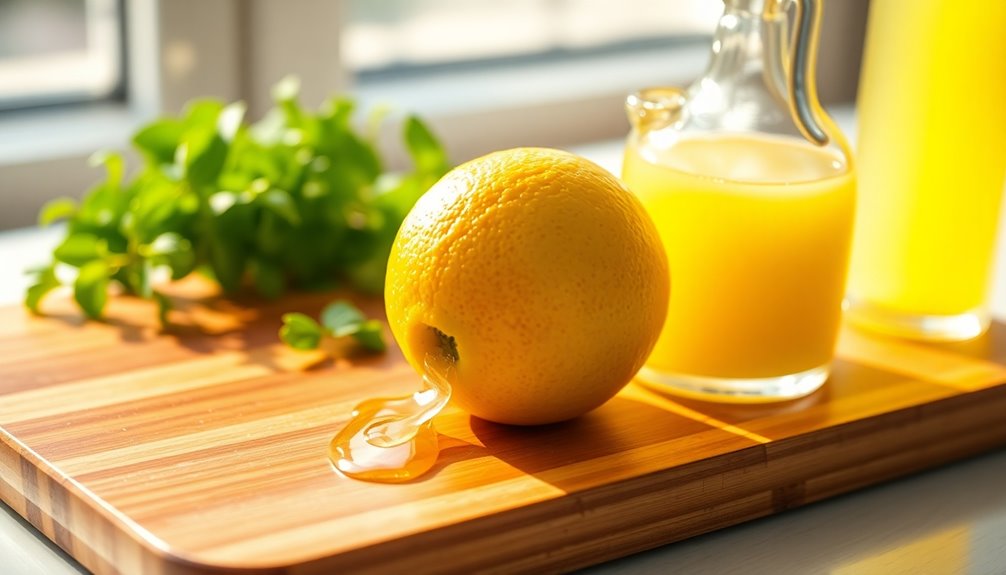Fresh lemon juice is good for about 1 to 4 days in the fridge. For the best flavor and freshness, you should use it within the first couple of days. If left at room temperature, it only lasts about a day. Be on the lookout for signs of spoilage like off odors, cloudiness, or changes in color. If you want to extend its life, there are handy storage tips and methods you can try. To maximize the shelf life of your fresh lemon juice, consider storing it in an airtight container to minimize exposure to air. Additionally, you can freeze lemon juice in ice cube trays for later use, which allows you to add a burst of flavor to your recipes at any time. For those wondering how to store fresh lime juice, the same principles apply; keep it refrigerated in a tightly sealed container and watch for any signs of spoilage to ensure optimal freshness.
Key Takeaways
- Fresh lemon juice lasts about 1 to 4 days in the fridge for optimal flavor and freshness.
- At room temperature, fresh lemon juice is only good for about a day.
- Signs of spoilage include off odors, cloudiness, color changes, altered texture, or mold.
- Freezing lemon juice can extend its shelf life up to 6 months when stored properly.
- For best taste, consume fresh lemon juice within the first few days after juicing.

When it comes to fresh lemon juice, you'll want to know how long it stays good to enjoy its vibrant flavor. Freshly squeezed lemon juice offers a delightful tang and numerous health benefits, but its shelf life is relatively short. If you store it properly in the fridge, it typically lasts about 1 to 4 days. After that, the quality can decline, and you'll need to be cautious of spoilage.
At room temperature, freshly squeezed lemon juice is only good for about a day. This rapid spoilage means you should always consider your storage conditions. If you plan to use the juice later, you should definitely keep it in the fridge. When stored in the fridge, fresh lemon juice maintains its quality for up to 4 days, with the first couple of days being the best time to consume it for optimal flavor and freshness. The longer you wait, the more likely you're to encounter signs of spoilage.
Spoilage can manifest in various ways. You might notice off odors, cloudiness, or changes in color and texture. If you see any signs of mold or a strange smell, it's best to err on the side of caution and discard the juice. Always remember, for your safety and enjoyment, consuming freshly squeezed lemon juice within the first few days is highly recommended.
If you find yourself with more lemon juice than you can use right away, you can freeze freshly squeezed lemon juice. This method extends its shelf life significantly, allowing you to enjoy that zesty flavor for up to 6 months without significant loss of quality. Just pour the juice into ice cube trays, freeze it, and then transfer the cubes to a sealed bag or container. This way, you can easily thaw and use just what you need while keeping the rest safely stored away.
To ensure your lemon juice lasts as long as possible, pay attention to how you store it. Always use airtight containers to minimize exposure to air and light, both of which can accelerate spoilage. Keeping the juice cold is essential, as even slight temperature fluctuations can affect its freshness.
Frequently Asked Questions
How Long Can I Keep Fresh Lemon Juice in the Fridge?
You can keep fresh lemon juice in the fridge for about 2 to 4 days if you store it properly in an airtight container.
It's best to use it within this timeframe to enjoy its optimal flavor. After a couple of days, you might notice a decline in quality.
If you want to extend its shelf life, consider freezing the juice, which can preserve its quality for up to six months.
How Can You Tell if Lemon Juice Has Gone Bad?
To tell if lemon juice has gone bad, check its color; it should be light yellow.
If you notice darkening or cloudiness, it's time to toss it.
Smell the juice—any strong, unpleasant odor indicates spoilage.
Look for visible mold, which means it's not safe to consume.
Lastly, if the taste is more sour or bitter than usual, don't hesitate to replace it.
Always prioritize your safety!
How Do You Preserve Fresh Lemon Juice?
Imagine capturing sunshine in a bottle.
To preserve fresh lemon juice, store it in an airtight container and pop it in the fridge for 2 to 3 days. If you want to keep it longer, freeze it in ice cube trays, then transfer the cubes to a freezer bag.
Remember to leave some headspace for expansion. Using dark containers helps shield it from light, preserving its vibrant flavor.
Always check for spoilage before using!
Can Fresh Lemon Water Go Bad?
Yes, fresh lemon water can definitely go bad. If you leave it out at room temperature, it might spoil within a few hours, resulting in off tastes or smells.
When you store it in the refrigerator, aim to drink it within 1 to 2 days for the best flavor. Always check for signs like cloudiness or a sour odor before consuming, and toss it if you notice any mold or unusual changes.
Conclusion
So, if you've got a bottle of fresh lemon juice sitting in your fridge, don't just let it languish like a forgotten sock in the dryer! You've got about a week to use it before it starts plotting its sour revenge on your taste buds. Remember, it's not a fine wine—it won't get better with age! So grab that zesty goodness and start squeezing before it decides to turn your culinary dreams into a bitter reality.
Cindy thoroughly researches juicing trends, techniques, and recipes to provide readers with practical advice and inspiration. Her writing style is accessible, engaging, and designed to make complex concepts easy to understand. Cindy’s dedication to promoting the advantages of juicing shines through her work, empowering readers to make positive changes in their lives through the simple act of juicing.











